¡Calurosos saludos a toda la comunidad HIVE! El relato a continuación es una ficción de un personaje real- aún tiene su zapatería en Upata- claro está, que los nombres propios han sido alterados.
Esta corta narración -primera parte- pudiera situarse entre la serie de “Encuentros y Siluetas” y “Vivencias”. Agradeciendo siempre, su consecuente lectura a estas breves notas.
Warm regards to the entire HIVE community! The story below is a fiction of a real character - he still has his shoe store in Upata - of course, the proper names have been altered.
This short narration -first part- could be placed between the series of “Encounters and Silhouettes” and “Experiences”. Always thanking you for your consistent reading of these brief notes.

Algunas veces llegaba a su local-una pequeña zapatería en el centro de la ciudad- cuando aún no eran las seis de la mañana y la oscuridad acompañaba las calles y la esquina donde quedaba la tienda en cuestión.
Una vez levantado el sol completamente-y aunque estuviera lloviendo- abría las “Santa Marías” o puertas de metal, que protegían “el negocio”.
Sometimes he would arrive at his shop-a small shoe store in the center of town-when it was not yet six o'clock in the morning and it was dark in the streets and on the corner where the store was located.
Once the sun was fully up-and even if it was raining-he would open the "Santa Marías" or metal doors, which protected "the business".
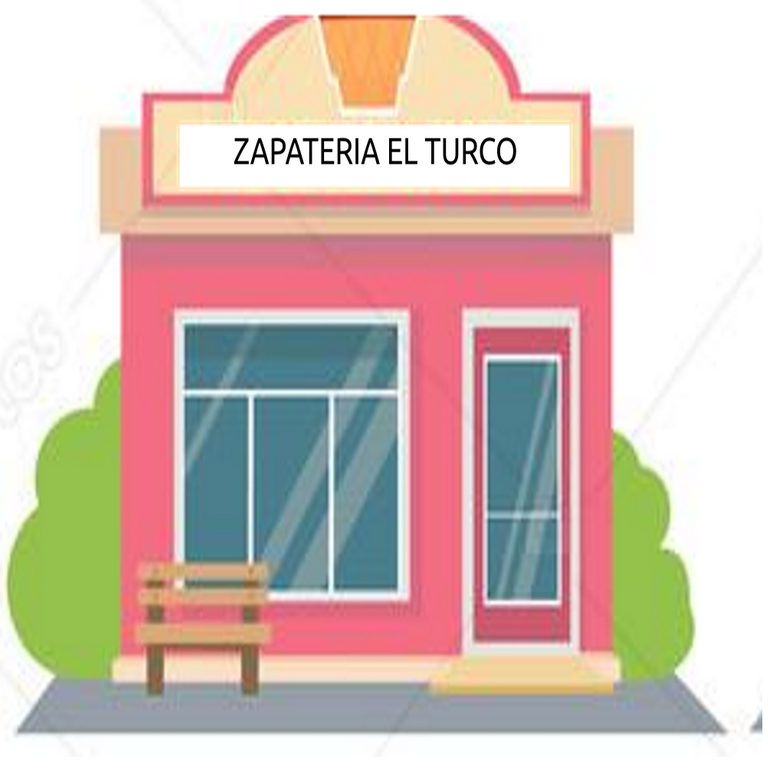
Como era muy temprano-apenas las siete- y la muchacha que tenía empleada no había llegado, el joven Baisal emprendía nerviosamente una caminata dentro de la zapatería, iba de un lado a otro, se asomaba a la calle, volvía adentro, moviendo sus brazos y hombros; denotando en su gestualidad desesperación. Entonces “prendía” un aparato de sonido mediano, colocando la corneta cerca de una de las entradas-tenía tres puertas o entradas- seguidamente sonaba una extraña música: Mezcla de melodías para reflexionar, con arengas patriótica dichas en árabe.
As it was very early-barely seven o'clock-and the girl he had employed had not arrived, the young Baisal nervously started a walk inside the shoe store, going from one side to the other, looking out onto the street, going back inside, moving his arms and shoulders; denoting desperation in his gestures. Then he would "turn on" a medium-sized sound device, placing the bugle near one of the entrances - it had three doors or entrances - followed by the sound of strange music: a mixture of reflective melodies with patriotic harangues spoken in Arabic.
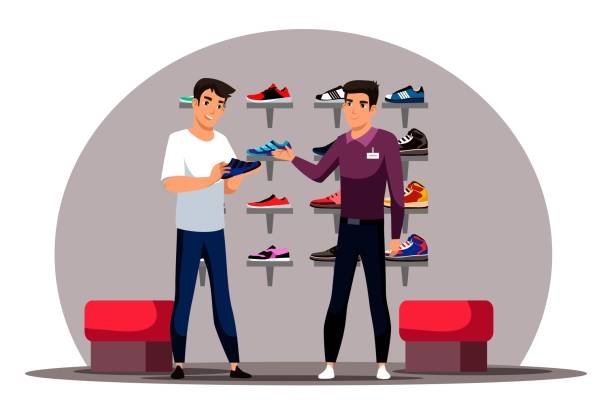
El “Turco” era de origen sirio, es decir sus padres eran sirios, había nacido en Upata, pero lo llevaron de pequeño a Siria; donde pasó cinco años, regresando nuevamente a Venezuela.
El viaje a Siria – en ese entonces tenía apenas ocho años-se debió a una extraña enfermedad que aquejó a la mamá. Un día la pobre mujer, comenzó a tener sueños con su bisabuela; la cual estaba muerta hacía cincuenta años, Damara -nombre de la mamá de Baisal- nació quince años después.
Después comenzó a ver perros y loros por todas partes, según ella, la casa era un escándalo propiciado por estos animales(Por supuesto que nunca hubo ni perros ni loros) Una tarde alarmó a todos en la casa diciendo que había soñado volando encima de una vaca.
Luego sufrió de sonambulismo, se paraba siempre a la una de la mañana, abría la nevera y cualquier cosa era buena para comer; verduras crudas, granos secos, carne cruda también, etc.
Aunado a esa condición, le dio por tener celos de mujeres imaginarias o reales. Algunas veces veía desconfiada al marido, cuando este, le probaba un calzado a una hermosa cliente.
Había que agarrarla, porque si no, se daba de golpes y mordiscos con la inocente mujer.
Fue precisamente una de estas escenas de celos, la que rebasó la tolerancia del marido.
A la semana siguiente, la llevaba al aeropuerto de Ciudad Guayana, también iba el niño Baisal; en la mano, el hombre traía dos boletos de avión, con destino a Siria sin escala, uno era para la esposa y otra para el hijo.
Una gran maleta con los vestidos de la mujer y un pequeño bolso con la ropa del niño, aterrizaron junto con ellos en la tierra del Halcón de Quraish, 12 horas después.
Con la mujer y el niño, iba una carta dirigida a los familiares de la esposa (El padre de Baisal era de los que seguían la tradición de escribir cartas, no usaba él corre electrónico, ni le gustaba hablar por teléfono con la familia de su esposa).
The "Turk" was of Syrian origin, that is to say, his parents were Syrian, he was born in Upata, but he was taken to Syria as a child, where he spent five years, returning again to Venezuela.
The trip to Syria - at that time he was only eight years old - was due to a strange illness that afflicted his mother. One day the poor woman began to have dreams about her great-grandmother, who had been dead for fifty years, Damara - Baisal's mother's name - was born fifteen years later.
Then she began to see dogs and parrots everywhere, according to her, the house was a scandal caused by these animals (of course there were never any dogs or parrots). One afternoon she alarmed everyone in the house saying that she had dreamt of flying over a cow.
Then he suffered from sleepwalking, he always stood up at one o'clock in the morning, opened the refrigerator and anything was good to eat; raw vegetables, dried grains, raw meat too, etc.
In addition to this condition, she became jealous of imaginary or real women. Sometimes she was suspicious of her husband when he tried on a shoe for a beautiful client.
She had to catch her, otherwise she would hit and bite the innocent woman.
It was precisely one of these scenes of jealousy that exceeded the husband's tolerance.
The following week, he took her to the airport in Ciudad Guayana, the child Baisal was also going; in his hand, the man had two plane tickets, one for his wife and one for his son, bound for Syria without a stopover.
A large suitcase with the woman's clothes and a small bag with the child's clothes landed with them in the land of the Quraish Falcon 12 hours later.
With the woman and the child went a letter addressed to the wife's relatives (Baisal's father was one of those who followed the tradition of writing letters, he did not use electronic mail, nor did he like to talk to his wife's family on the phone).
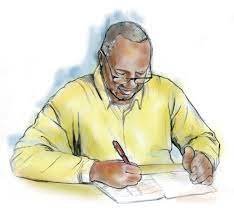
La carta | The chart
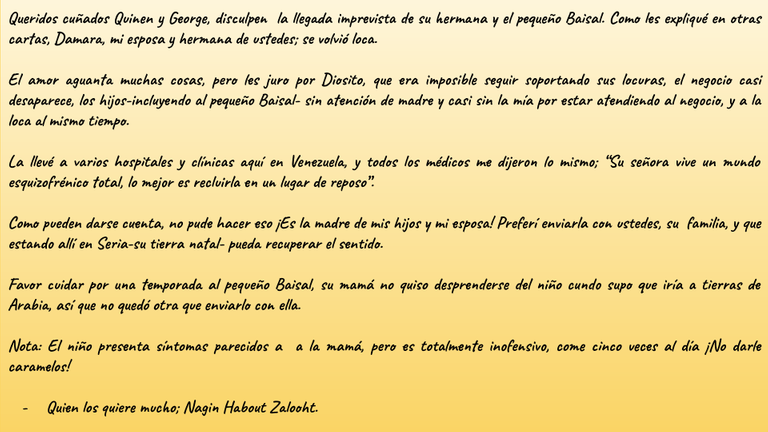
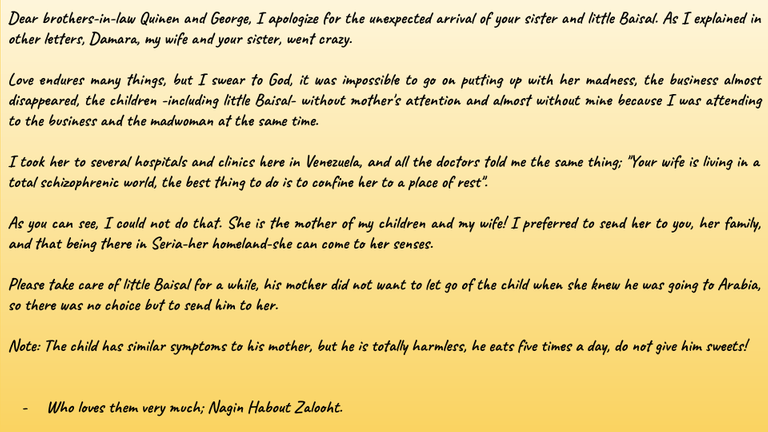
Al poco tiempo de estar con sus hermanos y primos, la madre fue recluida en un lugar tranquilo y apartado de la ciudad -un manicomio- mientras que el niño Baisal, vivió con un hermano de su padre, trabajando como mandadero del tío- entregaba paquetes de comida a domicilio. Pasaron los cinco años y el “Turquito” regresó a Venezuela, viviendo Caracas unos meses y luego vino a Upata.
Le costó mucho volver hablar español- todavía a los 25 años su español es defectuoso- pero sus ojos relampagueaban como los de su madre, y había que verlo a las cinco de la mañana, antes de abrir el local: Iba de un lado al otro, hablaba solo, gesticulaba con un celular en la mano, de vez en cuando llamaba o hacía que llamaba. Un día, muy temprano -serían las seis y media de la mañana, a lo sumo, le pregunte "Baisal ¿Por qué abres tan de mañana, si a esta hora nadie anda por la calle?"
Me respondió “hermano, si dejo para mas tarde, los clientes van a la tienda del paisano del al lado” y seguidamente vuelve al ritual, que por años ha estado haciendo: Abre las puertas del “negocio”, saca la corneta hacia la calle y luego ¡Coloca la inefable música, mezcla de reflexión, seguida de arengas patrióticas en árabe! ¡Para su regocijo, y tormento de nosotros, sus vecinos!
Soon after being with his siblings and cousins, the mother was confined in a quiet place away from the city - an asylum - while the boy Baisal, lived with his father's brother, working as an errand boy for his uncle - he delivered food packages to homes. Five years passed and the "Turkish" returned to Venezuela, living in Caracas for a few months and then came to Upata.
It was hard for him to speak Spanish again - still at 25 years old his Spanish is defective - but his eyes sparkled like his mother's, and you had to see him at five in the morning, before opening the store: he would go from one side to the other, talking to himself, gesticulating with a cell phone in his hand, from time to time he would call or pretend to call. One day, very early - it would be six thirty in the morning, at the most, I asked him "Baisal Why do you open so early in the morning, if at this hour nobody is walking on the street?"
He answered me "brother, if I leave it until later, the customers go to the store of the countryman next door" and then he returns to the ritual, which he has been doing for years: He opens the doors of the "store", takes the bugle out into the street and then plays the ineffable music, a mixture of reflection, followed by patriotic harangues in Arabic! To his delight, and the torment of us, his neighbors!
Esperando volver a encontrarnos, través de un corto relato, me despido ¡Hasta pronto!
Hoping to meet again, through a short story, I bid you farewell. See you soon!
Enlaces de los recursos utilizados para edición de las
imágenes o publicación | Links to resources used for image editing or publication images or publication:
https://sp.depositphotos.com/93364448/stock-illustration-set-of-vector-flat-design.html
https://www.istockphoto.com/es/ilustraciones/vendedor-de-calzado
https://www.niddk.nih.gov/news/media-library/9141
https://www.freepik.es/vector-premium/vector-conjunto-personas-adultas-personajes-estilizados-grupo-personajes-dibujos-animados-planos-masculinos-femeninos-aislados_10589427.htm
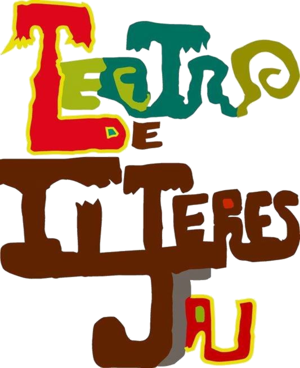


Congratulations @camborio! You have completed the following achievement on the Hive blockchain and have been rewarded with new badge(s):
Your next target is to reach 50 upvotes.
You can view your badges on your board and compare yourself to others in the Ranking
If you no longer want to receive notifications, reply to this comment with the word
STOPCheck out the last post from @hivebuzz:
Support the HiveBuzz project. Vote for our proposal!